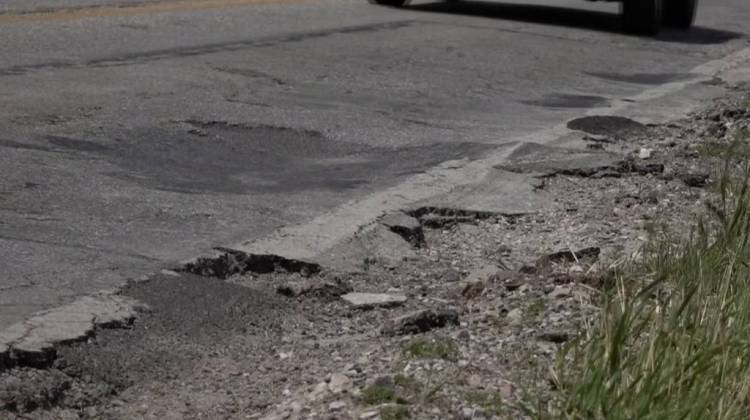
A solar array at Wible Lumber near Avilla, Indiana.
Photo courtesy of Eric Hesher/Renewable Energy SystemsMoney plays a big role in the development of renewable energy projects. Right now, solar energy faces two big challenges in Indiana that could make solar more expensive for some Hoosiers.
The first thing that worries solar advocates is the possibility of a tariff: that’s like a tax we pay on things imported from overseas, in this case, solar panels.
Earlier this year, two companies asked the U.S. International Trade Commission to put a tariff on foreign-made solar panels. The companies say low-cost Chinese-made panels, in particular, put them at a disadvantage and a tariff will bolster American-made panels.
“It’s a really technical issue,” says Rep. Dave Ober (R-Albion), chair of the House Utility and Energy Committee. “If the president decides to enact tariffs on imported panels for solar systems, that cost gets passed onto consumers and it eats away a lot of the price drop we’ve seen over the past ten years or so,” he says.
If panels are more expensive, then installing solar systems becomes more expensive, too. The Solar Energy Industries Association says tariffs could cost 88,000 jobs nationwide.
Kerwin Olson, director of Citizens Action Coalition, says that would be a shame, because right now solar jobs are growing faster than any other.
“It would have a significant impact, we would lose jobs as a whole,” he says. “We may pick up some in solar manufacturing, but that would not be enough to offset the job loss that would come as a result of people canceling solar installation jobs because of increased costs.”
Some Indiana companies do manufacture parts for solar systems, but most work on the installation side.
And many of these same companies testified against a controversial state energy bill, Senate Bill 309, passed last spring. In part, the bill reduces incentives for rooftop solar systems.
“All of the evidence in the marketplace is showing 309 made no sense that we would be building a wall around us, isolating us in the context of where future job growth is coming in the energy industry,” Olson says.
Ironically, many solar installers say the bill helped business as customers rushed to install systems before the full incentives go away at the end of the year. But they don’t expect that boom to last.
While many acknowledge the bill as harmful to the rooftop solar industry, there is a provision in it that cuts red tape for larger solar projects, says Indiana Energy Association president Mark Maassel.
“What we’re gonna see is people installing what makes sense to them,” he says. “So, I think what we’re talking about is creating options for customers.”
Maassel says it’s possible the bill paves the way for the state to produce more solar energy overall, even if less comes from rooftop solar.
But critics still say the bill curbs options, instead of creating them. Schools, especially, are installing more solar to reduce utility costs and say they need more time to profit from their investment.
To that end, Rep. Dave Ober says he’s drafting legislation to help.
“Public entities are not as nimble as their private counterparts as far as being able to manage money and fiscal resources to do these projects,” Ober says. “They need a little more lead time.”
The bill would grandfather schools for 20 years, which, Ober says, would give schools enough time to put money that would’ve gone to electric bills back into the classroom.
The 2018 legislative session begins Jan. 3. And President Trump is expected to make a decision on solar tariffs by Jan. 26.
 DONATE
DONATE









 Support WFYI. We can't do it without you.
Support WFYI. We can't do it without you.